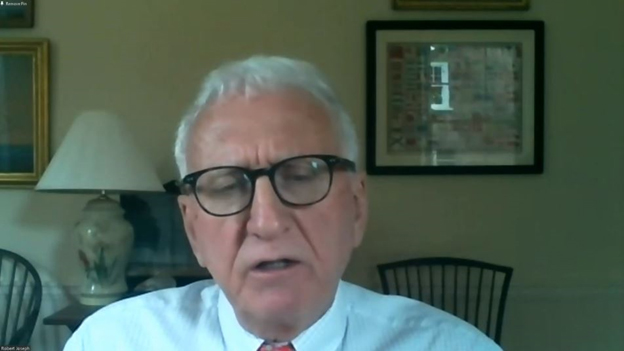Interview with Ambassador Robert Joseph, former Undersecretary of State for Arms Control and International Security about the uprising of the Iranian people
January 2023
How do you see the future of Iran?
I have always been optimistic about the future of Iran, and I remain so today. In the university, I studied the 1905 revolution and the demand of the Iranian people for a representative constitution. During the last 40 years or more of my professional career, I have watched the Iranian people rise up against the dictatorship of the shah and now the religious dictatorship that has ruled Iran for over 40 years. I believe that the Iranian people demand for freedom and for democracy has prevailed over decades of brutal, oppressive rule under both the shah and the mullahs. I think that the people have had enough, and that is very clear in what is unfolding across Iran in terms of the uprising. Well, let’s really call it a revolution. A revolution that indicates that the people have had enough. They’ve had enough of the corruption, the endemic, pervasive corruption of the regime. They’ve had enough of the incompetence of the regime, whether it’s in the response to the COVID pandemic, or the bankruptcy of the economy. They’ve had enough of the brutality, just to look at the brutality against women and against minorities. They’ve had enough of foreign adventures and Iran becoming, in the eyes of the world, a pariah state. But most important, they are now demanding their freedom and they’re demanding their basic dignity as human beings. And I think they will prevail. It may not happen today, it may not happen tomorrow or this month, but this regime is over. It will never be the same, and the people will continue to fight for democracy.
Do you think this was a spontaneous uprising? And what is the reason for the continuation of the uprising?
I think that we could say that the spark that lift the fuse for the current uprising, the revolution that we’re seeing unfolding in Iran today across the country, across all segments of the population, the lighting of the fuse was spontaneous. But the conditions, the conditions for the revolution, the reason that the revolution continues for now over four months or into the fourth month, is that the Iranian people have been brutalized, have been oppressed, and quite frankly, have had enough. They’ve had enough of this regime for many different reasons. And despite the crackdown, despite the oppression in the streets, despite the murders of over hundreds of people and the incarceration of thousands of protesters, the Iranian people continue to demand their freedom. And this is a reflection of the conditions in which they have lived for so long and also their determination to establish a democratic and free Iran. I think that the reason it has continued so long is because of the people’s demand for justice, but also because of the organized resistance that has been able to lead the effort to overthrow the religious dictatorship. And I think that the MEK has played a very important role in that, becoming the organized opposition to this religious dictatorship.
The regime claims that it has no viable alternative and the MEK has no popular support in Iran. How do you see this?
The line that the regime has taken for many years, that there is no alternative, is, quite frankly, propaganda. It’s propaganda on the part of the regime. It has had the effect that the regime has desired. It has led to policies of resignation and appeasement on the part of many countries in continuing to deal with this abhorrent regime. But it is propaganda. It is false because there is a democratic, secular, non-nuclear alternative to this regime. And one can see that in the ten-point plan of Madam Rajavi and the NCR I. And you can see that in the sacrifices that are being made by the Iranian people in the streets, there is an alternative. This is not Libya; this is not Syria. This is a country that is ready for democracy and has been ready for a long time. It needs the vision, it needs the organization, and much of that can be provided by the NCRI and the MEK. As for the regime’s statement that the MEK has no support inside Iran, well, this also has been a propaganda line for over 40 years. It reminds me of the line in Hamlet, if my recall of Shakespeare is right, that the Lady Doth protests too much.
If in fact, the MEK has no support, why has the regime been demonizing it for over 40 years, including today? The uprising is blamed, yes, on the United States and on Israel and on foreign powers. But internally inside Iran, they’re pointing to the MEK. And on this one, they’re right, because the MEK is instrumental in what is going on in Iran today, in providing through the resistance units the means to continue this revolution.
Why do you support the MEK. and the National Council of Resistance of Iran.
I have been a longtime supporter of the NCRI and the MEK because I believe they provide the vision for the future of Iran, a democratic, secular, free Iran and Iran in which there is equality of the sexes. I came into sort of this set of issues when I was working on nonproliferation. And many years ago, I concluded that the only means of dealing with the nuclear threat from Iran was to see a new democratic republic established. And the MEK provides sort of the pathway to that democratic republic. And I think it’s important, not just for me to support, but for others and governments to support what is going on inside and outside of Iran in terms of trying to assist the Iranian people in shaping their future, a future of freedom and democracy.

